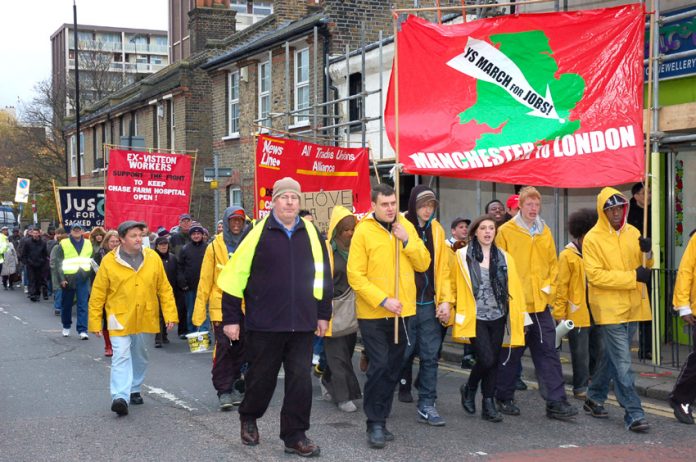
THERE are nearly one-and-a-half million workers and youth in the UK who want full-time work but are working part-time because they cannot find full-time jobs.
This is shown in the unemployment figures released by the Office for National Statistics yesterday.
According to yesterday’s figures, the number of people out of work fell by 46,000 to 2.56 million in the three months to June.
But Coalition claims that the unemployment levels are falling are repudiated by a closer look at the figures.
Part-time employment in the UK hit a record high in the period, up 16,000 to 1.42 million, the highest figure since records began in 1992.
The number of people unemployed for more than two years hit 422,000 in the three months to June.
The number of people successfully claiming Jobseeker’s Allowance fell by 5,900 to 1.59 million in July.
In the 16-to-24 age group unemployment fell by a puny 4000, with 1.01 million young people still unemployed.
Levels of unemployment in some parts of the country are more severe than others.
Shadow work and pensions secretary Liam Byrne said: ‘It looks like about 90% of the fall in unemployment has been in London where there has obviously been a boost from the Olympics.
‘In about half of Britain’s regions you’ve got unemployment going up.’
The TUC warned that the outlook for young people is its toughest since 1994, with the proportion in full-time education rising from 24% in 1992 to 41% this year.
‘Students looking to start their careers or continue in their education next month are facing the toughest climate for nearly 20 years,’ said TUC general secretary Brendan Barber.
He continued: ‘The number of people under 25 who are neither working or in full-time education has risen again to nearly 1.5 million.
‘The government’s response to this youth jobs crisis has been poor. Successful initiatives have been scrapped and then reinstated with less funding.
‘Young people are still awaiting a replacement for Educational Maintenance Allowance to support them through their education too.’
Meanwhile, wages for the under-30s have dropped significantly, it has emerged.
Earnings for employees aged 16-29 years fell by 6.4 per cent from 2003 to 2010, representing the biggest pay contraction across the UK workforce, research from the Resolution Foundation has found.
Men in 16-29 age group were worst hit as their average wages fell 8.6 per cent, while women’s incomes were cut by 5.8 per cent.
The think tank said that there was a 10% decline in pay for young workers between 2003 and 2011.
Gavin Kelly, chief executive at the Resolution Foundation, said: ‘It could be that these numbers look scary because they are, actually, genuinely scary.
‘For many economists the performance of young people in the jobs market is a barometer – or an early warning signal – of the health of the wider economy.’